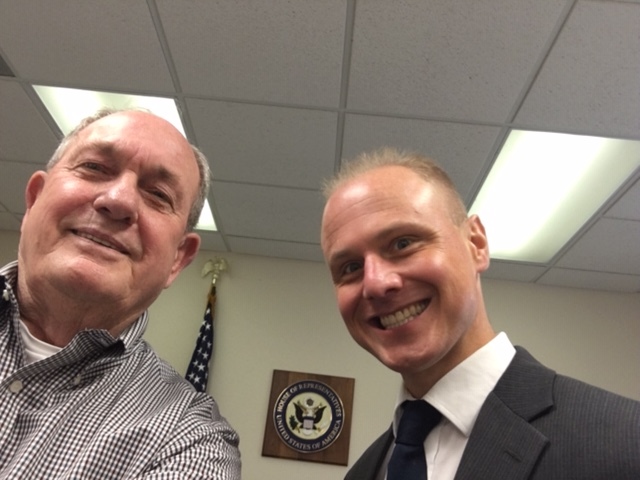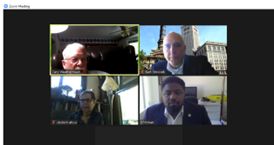In 2022, all 6 Ohio chapters participated in the Advocacy in Action campaign. All Congressional Districts and our 2 Senators were divided amongst the Chapters and Council and all legislative leaders were contacted. We interacted with all of their offices and discussed the 3 MOAA designated topics. One Senators office did not respond.
The 3 topics for discussion were:
- Major Richard Star Act. This act is needed to ensure that over 50,000 combat veterans receive concurrent pay of their vested longevity pay and their VA disability.
- Military Pay and Benefits: Backbone of the All-Volunteer Force. Competitive pay is essential to recruiting and retaining an all-volunteer force.
- Affordable mental health care for TRICARE Beneficiaries. Military families, retirees and their families, and survivors deserve a high quality, comprehensive health care benefit, yet TRICARE beneficiaries pay far more for mental health care than those covered by commercial plans.
This year was another successful year for Ohio Chapters and AiA. Chapters reported considerable support from Ohio Congressional leaders. Many are sponsors of bills or are looking to sponsor bills to support these initiatives.
Ohio Western Reserve Chapter

On 7 April 2022 at 1500 hrs., we connected with Patricia Clarke, Representative Gonzalez’s Legislative Assistant (photo not available). Our videoconference lasted until about 1525 hrs. Representative Gonzalez was not available to talk with us. We had a very good connection discussed the three key issues MOAA is concerned about. While discussing H.R. 1282, Ms. Clarke indicated that Representative Gonzalez was a cosponsor for that bill. and we could see and hear each other clearly. MS Clarke said that Representative Gonzalez was not as familiar with H.R. 4824. She listened to our presentation and asked several clarifying questions. She said she will talk with Representative Gonzalez and pass this information to him. We spent several minutes discussing the Military Pay Raise (Full ECI) and she said she understood the importance of the pay raise. John Anderson, the Legislative Chair for our chapter also participated. We had one technical glitch and we unable to save any screenshots.
We closed the discussion and asked if she had any other questions. We sent her a copy of the PowerPoint presentation that we used plus the MOAA Fact Sheets. She thanked us and said she will discuss these points with Representative Gonzalez and contact us if he has additional questions.

We connected with Representative Bob Gibbs’ office at 1440 on 28 April 2022 and finished our videoconference at 1510. Representative Gibbs was not available, but we talked with Madeline Perrino, his legislative assistant.
She talked with us for about 25 minutes. We covered all three topics, and she said the Representative Gibbs was familiar with HR 1282 (MAJ Richard Star Act) and that it had a lot of cosponsors. We sent her a copy of the PowerPoint presentation that we used plus the MOAA Fact Sheets. She said he was not as familiar with HR 4824 (Stop Copay Overpay Act), but she would discuss that with the Congressman.
She also said she appreciated the importance of the Military Pay Raise and would tell the Representative about our interest in it.
She said she would talk to Representative Gibbs about our discussion, and she rechecked our email addresses for any follow-on questions
We forwarded her a copy of the PowerPoint slides we used in our presentation and thanked her for her time and attention.
Greater Cincinnati’s Meeting Summary
Submitted by LTC Paul Fellinger, USA Ret
I met with David McCandless, Representative Steve Chabot’s local representative, at his Lebanon office on April 6. We discussed The Richard Star Act, The Stop Copay Overpay Act, and the Military Pay Raise at 4.6% (per the Employment Cost Index). Mr. McCandless was very receptive about the 3 issues and said he would present our concerns to Rep. Chabot’s Legislative Aide. However, he would not make any commitment as to Rep. Chabot’s positive support. He did ask about The Richard Star Act’s financial impact on the federal budget. Colonel Curray provided the budgetary impact below, and I forwarded it on to Mr. McCandless.

“BLUF: the effect on the budget would be an increase in outlays from the Retirement Trust Fund. In the scale of all our current issues and impact on those who were unable to serve a full 20 years, the outlay increases would be negligible.
” The Star Act has an unofficial Congressional Budget Office estimate of over $7 Billion/10 years. An official score will not occur until the bill gets out of committee, which is not likely to occur as the issue will be finalized through the NDAA – and as that bill takes shape, we might get an official estimate. As noted, this bill will affect DoD retirement pay and we believe DoD has the means to absorb the cost. Those combat injured who would receive Concurrent Receipt would no longer receive CRSC payments from DoD – that trade-off is not included in the $7 Billion rough estimate, but it could come close to cutting that cost in half.
“Of interest, the last Continuing Resolution Froze $3 Billion in funds for the Afghan Security forces and might be something Congress can realign to help pay for the Star Act. Although MOAA does not advocate for a specific “pay for,” because we do not have visibility on all the options, we also don’t want to risk putting the cost burden on other uniformed services like increases in TRICARE fees or copays.
“The Star Act is reasonable and is a similar strategy to the repeal of the widow’s tax that was also an offset injustice. The Star Act does not have a “pay for”, just like the widow’s tax, and will require a supermajority of cosponsors in the House to proceed. When the widow’s tax went before the House Rules Committee as an amendment to the NDAA, the committee was able to waive the “pay go” rule and find the amendment to repeal the offset in order. The goal now is to reach 290 cosponsors on the Star Act, in the House, for it to considered in the Rules Committee work up toward the NDAA.
“For other reference: Ohio has Both Senators in support of the Star Act – Great!”
On 27 April 2022 BG O’Brien and CAPT Drefahl met with Representative Wenstrup’s District Director, Alex Scharfetter. Full disclosure, Rep. (COL, USAR) Wenstrup is a Life Member of MOAA and the Chapter so we received a warm reception. We went over the three main issues in some detail. Alex indicated tha Rep. Wenstrup was on board but, as Alex explained, the more sponsors a bill has, the better its chances. We took a photo with Alex and are searching for it. Rep. Wenstrup is a firm supporter.
Dayton Chapter Meeting Summary
Submitted by Tom Robisch
We had the following meetings:
Marshall Macheledt of Rep. Jim Jordan’s office (OH 04) on 13 April.
Mike Davin of Rep. Latta’s office (OH 05) on 12 April.
Zachary Taylor of Rep. Turner’s Office (OH 10) on 26 April.
All the meetings were pleasant.
Marshall Macheledt thought Rep. Jordan would certainly support the full 4.6% pay increase and would likely support the Star Act. We asked that the Congressman become a cosponsor. He was uncertain about the TRICARE mental health copay issue, and we tried to emphasize the equity of this issue. ie, bringing TRICARE copays in line with commercial plans.
Mike Davin thought Rep. Latta would support all three issues. He said the Congressman will certainly support the full pay increase and that mental health is one of the Congressman’s priorities. He also said that the Star Act would probably be included in the NDAA this year. We asked that the Congressman consider becoming a cosponsor of the Star and copay acts.
Zachary Taylor was also generally supportive. Rep. Turner has already signed on as a cosponsor of the Star Act, and we asked him to look into how this matter is moving through the legislative process. He said he would do so and get back to us, but that hasn’t happened yet. He said that Rep. Turner would certainly support the full pay increase, but he wasn’t sure that the House would act on the copay issue this year. He understood the issue but thought that MOAA’s effort this year may raise awareness for some future action.
Greater Cleveland Chapter Meeting Summary
The Greater Cleveland Chapter of the MOAA led the Advocacy in Action (AiA) engagement with Ohio congressional representatives of the 9th, 11th and 14th districts. During the month of May 2021, chapter members COL (Ret.) Bart Stovicek, COL (Ret.) Cary Weatherhead, and Katherine Reinhardt participated in video conference calls with congressional staffers from each district to discuss MOAA legislative priorities:
#1: Toxic Exposure – TEAM Act (Toxic Exposure in the American Military)
#2: TRICARE Young Adult (TYA)
#3: Basic Needs Allowance

We held our initial meeting with Mr. Zach Moses, Senior Legislative Liaison for Representative Dave Joyce, OH D14. Mr. Moses was very knowledgeable of the details for each piece of legislation associated with each priority and acknowledged the need to address the issues. He was particularly interested to know how many active service members, or military families reside in Northeast Ohio. He could not commit to any action but assured our team that he would share our input with the congressman.
Our second call with Mr. Brehon Pittman, the Veterans and Military Affairs point of contact to former congresswoman Marcia Fudge, OH D11, was informational. While no immediate action was expected due to the vacancy resulting from Representative Fudge’s appointment as Secretary of the Department of Housing and Urban Development, Mr. Pittman’s response to our appeals was quite positive.
COL (Ret.) Stovicek held the last virtual call with LtCol Cole Hodge; Defense Fellow detailed to the office of Representative Marcy Kaptur, OH D9. This meeting was the most encouraging of the three. Given his military status, LtCol Hodge needed no convincing. He assured us that he would address these “no brainer” issues with congresswoman Kaptur.
Despite the encouraging dialogue we had with each of our representative’s staff there has been little movement by the Ohio delegation toward support to the legislation proposed. Representative Kaptur and Ohio’s newest congresswoman Shontel Brown, OH D11, each co-sponsored HR 475, The Healthcare Fairness for Military Families Act. Congressman Joyce has remained silent on all issues.
Advocacy in Action offered an opportunity to engage with our elected representatives to discuss priorities to our military community. Despite the underwhelming response from the Ohio delegation, we gained valuable experience, and will continue to advocate for those who serve.
Click the links below to see the notes from other years:
AIA 2021
AIA 2017